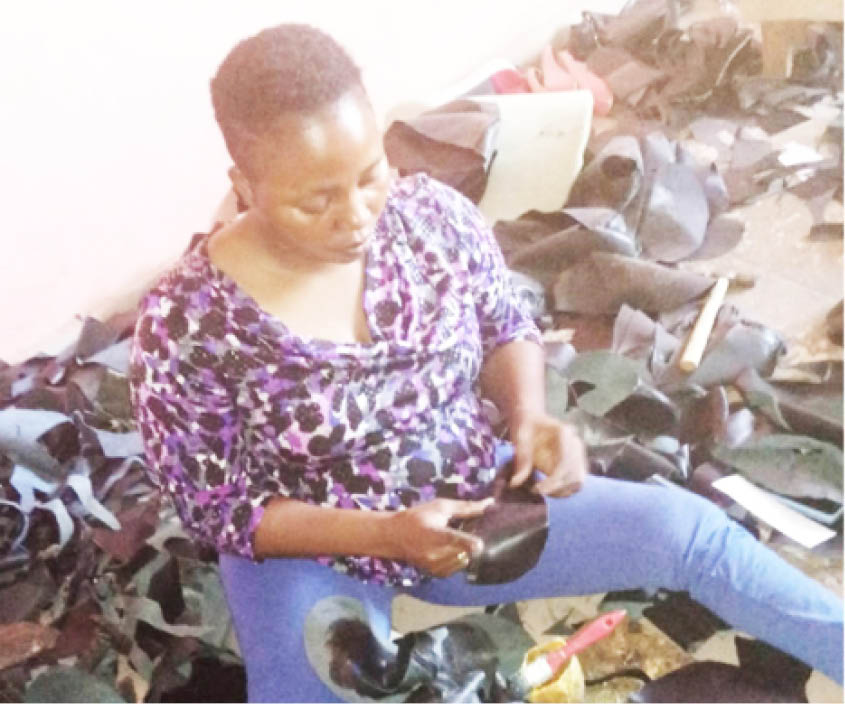Physically challenged university graduate turned shoemaker
Executive Director of BML Collections Limited, Mrs Bolanle Longe, has proven that there is ability in disability as her shoe-making factory supplied 1,500 pairs of shoes to schools in Oyo State. Years after earning a degree in Computer Science from the Obafemi Awolowo University, Ile-Ife, she was unable to secure a job and decided to […]

Executive Director of BML Collections Limited, Mrs Bolanle Longe
Executive Director of BML Collections Limited, Mrs Bolanle Longe, has proven that there is ability in disability as her shoe-making factory supplied 1,500 pairs of shoes to schools in Oyo State.
Years after earning a degree in Computer Science from the Obafemi Awolowo University, Ile-Ife, she was unable to secure a job and decided to attend vocational training.
“After graduating in 2010, I couldn’t get a job, perhaps because of my physical disability. In September 2014, I got a job with an oil-servicing company and I had to resign after about four months because the HR Manager didn’t want me there.
“She thought I would not be able to deliver. I proved her wrong though and I was able to deliver on a project assigned to me before I left. I didn’t choose shoemaking just like that. I had been doing different crafts such as bead-making, hair bands, hair packers and bow ties,” she said.
However, her journey to shoemaking began in 2017 when she took advantage of a skill acquisition programme organised by a parish of the Redeemed Christian Church of God.
“I registered for two sessions – hat- making in the morning and bag/slippers-making in the evening. After the training, I was selected as overall best graduating participant in both categories. I was then empowered with a start-up kit,” she said.
Happily married to Michael Longe in 2011, she said her husband has been helpful in making her realise her goals.
“One day, my husband opened my eyes to the fact that people may choose not to carry handbags but no one would dare go out without shoes. He encouraged me to learn shoemaking,” she said.
However, learning shoemaking was more difficult than she had envisaged. It took her enrolling as an apprentice with an experienced shoemaker for four months, after attending intensive two weeks training on two different occasions from the same institute that trained her during the skill acquisition programme.
“Before I completed the training, my husband mandated that I make a Cortina shoe for our daughter. I did and saw it was beautiful. We put the picture on Facebook and I started receiving orders from family and friends,” she explained.
She said her background in computer science has been useful in her shoe-making enterprise as she applied the knowledge of technical drawing learnt in the university in shoe design and pattern creation.
However, the mother of two lamented that poor power supply and getting raw materials for her production are some of the challenges crippling the industry.
“It has not been easy getting some of the raw materials. Nigerian leather is arguably the best but before you can purchase it from Kano, you must be ready to purchase a very large quantity. There are some types of shoe soles that are not manufactured here in Nigeria. We buy them at exorbitant prices from the importers. Sometimes, they are not even available, and it’s really affecting production,” she lamented.
With two directors, six full time employees and five on part-time, her outfit, equipped with modern machines, has supplied 1,500 shoes in 2021 alone to three schools in Oyo State.
She wants her outfit to become a household name for children’s shoes in Oyo State though her challenges are still visible.
Meanwhile, the Trade Promotion Advisor of the Nigerian Export Promotion Council (NEPC), Ibadan, Mrs Bolanle Emmanuel, on a visit to BML commended the outfit and encouraged Mrs Longe to always put in her best.
“What you are doing is commendable. You have proved that there is indeed ability in disability. You must strive to improve on your production and create more opportunities for marketing,” she advised.
